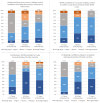Evaluation of a Multisectoral Health Security Alliance Program Through Perceptions of Member States: African Partnership Outbreak Response Alliance (APORA)
- PMID: 38720237
- PMCID: PMC11737319
- DOI: 10.1093/milmed/usae125
Evaluation of a Multisectoral Health Security Alliance Program Through Perceptions of Member States: African Partnership Outbreak Response Alliance (APORA)
Abstract
Introduction: U.S. DoD global health engagements offer opportunities for strategic engagement and building capability in collaboration with foreign military and civilian counterparts. Global health engagement activities can take the form of health security alliances and allow the USA and its allies and partners to prepare for, mitigate, and respond to emerging biothreats and other harmful health events that may negatively impact national security. One such example is the African Partnership Outbreak Response Alliance (APORA), which was designed to expand African Partner Nation militaries' infectious disease outbreak response capabilities. This publication evaluates the development, implementation, and outcomes of APORA to better understand the program's effectiveness in developing Partner Nation medical capabilities and the efficacy of health security alliances more broadly.
Materials and methods: Key informant interviews, focus groups, and questionnaires were used to collect responses from a sample of participants who attended an in-person APORA event in May 2022. The research team conducted thematic analysis of all responses to identify common themes and sub-themes in participants' perspectives and to elucidate findings and recommendations for future endeavors.
Results: The analysis determined that participants attended the APORA event primarily to disseminate and apply knowledge, skills, and abilities gained at the event to their own health system structures. Overall, participants indicated that APORA contributed to their countries' military medical and civilian cooperation, as well as their countries' military medical capabilities. Longer-term partners (i.e., 4+ years of APORA membership) agreed more strongly with these sentiments; newer partners (i.e., 1-3 years of APORA membership) were more likely to be neutral or agree to some extent. Participants also valued the opportunity to solidify global, regional, local, and peer partnerships and considered the ability to create partnerships of great importance to their countries' national health security. Language barriers were often listed as a hindrance to event participation and the overall integration of a regional health system response. Participants also cited resource scarcity, network erosion (particularly because of the coronavirus disease 2019 pandemic), and a lack of disseminating and communicating value-add in how APORA could/is providing to their member countries' health systems as key barriers.
Conclusions: As a whole, these findings support APORA's objectives to develop and leverage partnerships to support medical capacity building, promote collaboration between military and civilian sectors, and increase access to opportunities and financial resources. Further evaluation is required to capture additional civilian perspectives while continuing to expand upon military perspectives in order to produce more generalizable findings. That said, this study enables key stakeholders to understand how to strengthen and expand future alliances to improve both health and security outcomes.
© Oxford University Press 2024.
Conflict of interest statement
None to report.
Figures


References
-
- Cimmino J, Kroenig M, Pavel B: Taking stock: where are geopolitics headed in the COVID-19 era? Atlantic Council. Available at https://www.atlanticcouncil.org/in-depth-research-reports/issue-brief/ta..., June 1, 2020; accessed August 9, 2023.
-
- Mustasilta K: From bad to worse? The impact(s) of Covid-19 on conflict dynamics. European Union Institute for Security Studies. Available at https://www.iss.europa.eu/content/bad-worse-impacts-covid-19-conflict-dy..., March 18, 2021; accessed August 9, 2023.
-
- Joint and Coalition Operational Analysis : Operation United Assistance: the DOD response to Ebola in West Africa. Department of Defense, 2016. Available at https://www.jcs.mil/Portals/36/Documents/Doctrine/ebola/OUA_report_jan20...; accessed August 18, 2023.
MeSH terms
Grants and funding
LinkOut - more resources
Full Text Sources
Research Materials

